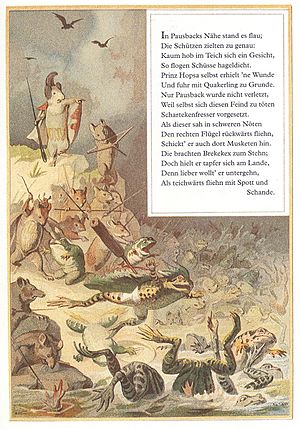Batrachomyomachia facts for kids
The Batrachomyomachia (which means "Battle of the Frogs and Mice" in ancient Greek) is a funny epic poem. It's like a parody (a humorous imitation) of the famous Greek epic, the Iliad. Many people think the ancient Greek poet Homer wrote it, but others have suggested different authors.
The word batrachomyomachia is now used to describe a small, unimportant argument. For example, it could describe a minor disagreement between groups of people, like those in a government.
The Story
The story begins when Psycharpax, a brave Mouse-Prince, escapes a hunting cat. He stops by a lake to drink and meets Physignathus, the Frog King. Physignathus offers to show Psycharpax his kingdom on the other side of the lake. The Mouse agrees and climbs onto the Frog King's back.
As they swim across the lake, a scary water snake appears! Physignathus dives underwater, completely forgetting about Psycharpax. Since the Mouse cannot swim, he sadly drowns.
Another Mouse on the bank sees Psycharpax's death. He tells the other Mice, who get ready for battle. They want to get revenge for the Frog King's actions. The Mice send a message to the Frogs, declaring war. The Frogs blame their King, who denies everything.
Meanwhile, Zeus, the king of the gods, sees the war starting. He suggests that the gods pick sides. He thinks Athena should help the Mice. But Athena refuses. She says both the Mice and the Frogs have caused her trouble. She believes it's smarter for the gods to just watch the battle.
A big fight begins, and the Mice start winning! Zeus then calls upon a group of crabs to stop the Frogs from being completely destroyed. The Mice can't fight against the crabs' hard shells. So, they retreat, and the one-day war ends at sunset.
Characters and Their Funny Names
Besides the well-known Greek gods, the Batrachomyomachia introduces many new characters. These are the leaders and warriors of the two armies. Their battles are described in strong, violent ways, much like the Iliad. But their weapons are just sticks and needles. Their armor is made from silly things like nut shells, bean pods, straw, leaves, vegetables, and even cat skin!
Much of the humor comes from this funny contrast. It also comes from the names of the warriors. These names often describe what the animals like to eat or do. For example:
Mice Warriors
- Psycharpax, "the crumb-catcher": This is the Mouse-Prince whose drowning starts the war.
- Meridarpax, "the scrap-catcher": A very strong Mouse-Prince.
- Lichopinax, "the dish-licker": He sees Psycharpax drown and tells the other Mice.
- Tyroglyphus, "the cheese-rasper": The father of another Mouse warrior.
Frog Warriors
- Physignathus, "the pouter": He is the Frog-King who accidentally drowns Psycharpax.
- Hydrocharis, "he who delights in the water": A Frog who crushes the Mouse-King with a stone.
- Hypsiboas, "the loud-croaker": A Frog who kills a Mouse with his spear early in the battle.
- Crambophagus, "the cabbage-eater": A Frog who tries to run away from the battle.
Who Wrote It?
The ancient Romans believed that Homer wrote the Batrachomyomachia. However, another ancient writer named Plutarch thought it was written by Pigres of Halicarnassus. Pigres was either the brother or son of Queen Artemisia I of Caria, who was an ally of Xerxes I.
In the 1800s, many scholars thought the poem was from the 5th century BC. But later studies of the language suggest it was written much later. It might have been written during the late Hellenistic period or even when the early Roman Empire was in power. Some people have even suggested Lucian as a possible author, but this would mean it was written after Plutarch's time.


